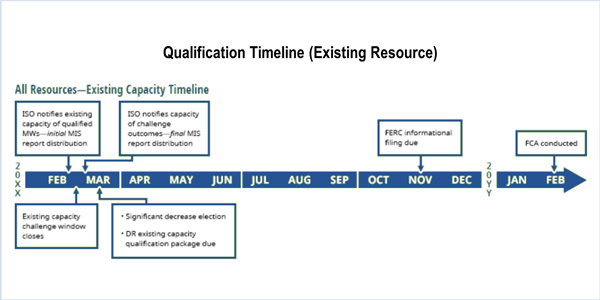By Michael Kuser
FERC accepted ISO-NE’s informational filing for Forward Capacity Auction 12, rejecting protests from a demand response provider and renewable generators over qualification rules (ER18-264).
The commission’s Jan. 19 order agreed with the RTO’s list of resources that qualified for the Feb. 5 auction for the 2021/22 delivery year. It also approved the three capacity zones to be modeled, which are unchanged from FCA 11.
Efficiency Maine Trust — a quasi-state agency that administers energy efficiency programs in Maine and is overseen by the state Public Utilities Commission — protested the RTO’s methodology for calculating existing capacity qualification values. The agency said ISO-NE inappropriately subtracts the amount of expiring measures from a demand resource’s qualified capacity from a prior FCA, rather than from the demand resource’s actual and known performance capacity, as reported in ISO-NE’s energy efficiency measure database.
ISO-NE rules define qualified capacity — the quantity for which a capacity supplier is compensated — as the lower of the resource’s summer or winter qualified capacity. When a capacity supplier’s summer and winter qualified capacity is significantly different, as is the case with the Efficiency Maine programs, the supplier will not receive compensation for the higher seasonal capacity unless it can pair the higher capacity with other resources in a composite offer.
Efficiency Maine said the RTO’s rules would deny it compensation for $3.7 million in capacity for FCA 12, although it said it has been able to reduce the loss to $1.5 million through composite offers covering its entire qualified summer capacity.
The commission said Efficiency Maine projects performed above their qualified capacity because measures installed after the initial clearing of the resources. “We agree with ISO-NE that Efficiency Maine should have sought to qualify any additional capacity prior to such additional measures being in service. Accordingly, to the extent that the Efficiency Maine projects’ overperformance is the result of Efficiency Maine’s failure to seek to clear new incremental capacity in the FCA, we find it inappropriate to now mitigate the consequences of that action (or inaction) through changes to the demand resource methodology.”
The commission also agreed with the RTO “that it would be inappropriate for the commission to require ISO-NE to use Efficiency Maine’s proposed methodology for the Efficiency Maine projects while still using the current demand response methodology for all other energy efficiency resources with expiring measures.”
Renewable Technology Resource Exemption
The commission also rejected a joint protest by CPower and Tesla, which combined to enter Tesla’s SolarCity rooftop generation into the auction.
The companies asked the commission to require ISO-NE to re-evaluate the renewable technology resource (RTR) designation for five solar projects and one combined solar and fuel cell project.
The projects passed the RTO’s qualification process and were assigned the default offer review trigger price (ORTP) — a price floor based on the cost of new entry — of $12.864/kW-month. CPower said it did not challenge the ORTP because it sought to use the RTR exemption to receive an offer floor price of $0/kW-month. RTO rules permit up to 200 MW of RTR exemptions annually to renewable resources receiving out-of-market revenue through state renewable portfolio programs.
In October, however, ISO-NE rejected CPower’s application as incomplete. CPower contended the additional information the RTO requested meant that new resources must already be accepted into a state RPS program and receiving revenue to qualify for RTR designation, contrary to the RTO’s Tariff.
ISO-NE responded that although CPower’s qualification package was sufficient to determine an appropriate capacity amount to qualify each resource, it lacked details necessary to determine whether each resource met the requirements for an RTR designation.
The commission sided with the RTO.
“Although CPower’s qualification package contains some location-specific information and that CPower’s RTR submittal contains general information on possibly applicable RPS statues and regulations, we agree with ISO-NE that neither sufficiently enable ISO-NE to determine the specific provisions and manner (e.g., on an individual or aggregate basis) in which the renewable projects seek RPS qualification,” the commission said. “We agree that such specificity is necessary for ISO-NE to have sufficient certainty that the renewable projects will still qualify as RTR resources by the time of the relevant capacity commitment period. Thus, we find that CPower failed to comply with the Tariff’s requirements to obtain RTR designation.”
Zones and Resources
As in FCA 11, ISO-NE will model three capacity zones in FCA 12: Southeastern New England (Southeastern Massachusetts, Rhode Island and Northeastern Massachusetts/Boston), which will be modeled as import constrained; Northern New England (Maine, New Hampshire and Vermont), which will be modeled as export constrained; and Rest of Pool (Connecticut and Western/Central Massachusetts).
The installed capacity requirement (ICR) is 34,683 MW. After accounting for 958 MW per month of Hydro-Québec interconnection capability credits, FCA 12 will procure a net ICR of 33,725 MW.
ISO-NE qualified 5,605 MW of new resources and 35,007 MW of existing resources: 30,702 MW from intermittent and non-intermittent generation; 82 MW from imports; and 3,224 MW from demand resources.
The RTO said 2,309 MW of static de-list bids — one-year exemptions from the auction — were submitted for FCA 12.





